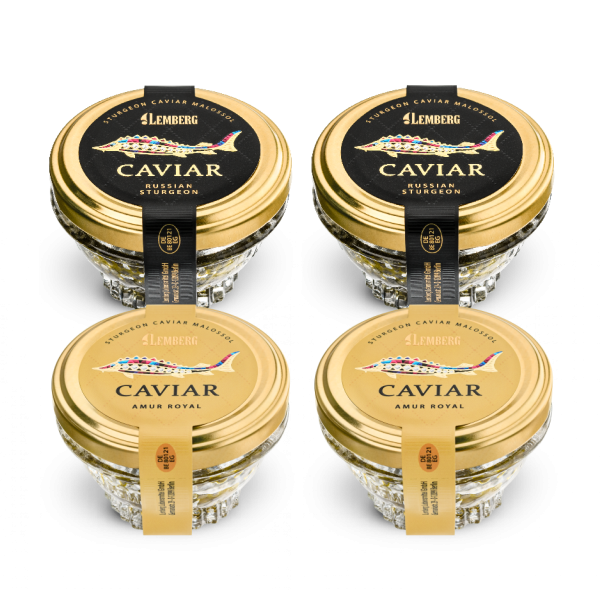Speisekarte

WAS MÜSSEN SIE ÜBER DIE LAGERUNG VON KAVIAR WISSEN?
Dieser ausführliche Leitfaden behandelt die wichtigsten Aspekte der Kaviarlagerung – von der richtigen Temperatur über die Haltbarkeit bis hin zu bewährten Methoden, mit denen Sie die Frische, den Geschmack und die Qualität Ihres Kaviars optimal bewahren können.
Hersteller empfehlen, Kaviar innerhalb von 2–3 Tagen nach dem Öffnen der Verpackung zu verzehren.
Das Erste, was man über die Lagerung von Kaviar wissen sollte: In Metalldosen verdirbt er sehr schnell. Einige Hersteller verpacken ihr Produkt auf diese Weise und behandeln es speziell, doch nach dem Öffnen sollte der restliche Kaviar unbedingt in ein geeignetes Gefäß umgefüllt werden – idealerweise in Glas- oder Kunststoffbehälter.
Wie lange ist Kaviar haltbar?
Die Haltbarkeit von Kaviar variiert je nach Marke und Art des Produkts.
- 2–3 Tage in einer geöffneten Dose oder Verpackung
- 1,5–2 Wochen in Kunststoffbehältern nach vorheriger Behandlung
- 3–4 Wochen in Glasbehältern nach vorheriger Behandlung
- 6 Monate im Tiefkühler (0–+4 °C), wenn ungeöffnet und konstant gekühlt
- 9 Monate in ungeöffneter Originalverpackung ab Herstellungsdatum bei optimaler Lagerung
Die Haltbarkeit hängt stark davon ab, ob der Kaviar geöffnet oder versiegelt ist und unter welchen Bedingungen er gelagert wird. Hier eine Übersicht:
| Lagerbedingung | Geöffneter Kaviar | Geschlossener Kaviar |
|---|---|---|
| Kühlschrank (0 °C) | 24–48 Stunden | 4–6 Wochen |
| Tiefkühler (–18 °C) | Nicht empfohlen | Bis zu 1 Jahr |
| Zimmertemperatur | Bis zu 24 Stunden | 24–36 Stunden |
Wie kann man die Haltbarkeit von Kaviar verlängern?
Wenn Sie den Kaviar länger lagern möchten, sollten Sie ihn in ein Glasgefäß mit luftdichtem Deckel umfüllen. In Kunststoffbehältern hält sich Kaviar im Kühlschrank nur rund zwei Wochen.
Falls kein Glasbehälter zur Hand ist, gibt es einen praktischen Trick: Geben Sie nach dem Einfüllen des Kaviars 2–3 Esslöffel Pflanzenöl oben auf. Das Öl verdrängt Sauerstoff zwischen den Eiern und bildet einen Schutzfilm – ideal, wenn der Behälter nur halbvoll ist.
Wie erkennt man verdorbenen Kaviar?
Verdorbener Kaviar lässt sich anhand klarer Anzeichen erkennen, die ernst genommen werden sollten:
- Geruch: Frischer Kaviar hat einen leichten Meeresduft. Ein starker Fischgeruch ist ein Warnsignal.
- Farbe und Aussehen: Auffällige Veränderungen können auf Verderb hinweisen.
- Textur: Die Eier sollten fest, aber zart sein. Wenn sie matschig oder hart werden, ist der Kaviar verdorben.
Im Zweifelsfall sollte man vorsichtig sein und den Kaviar entsorgen. Verdorbener Kaviar kann zu Lebensmittelvergiftungen führen – besonders gefährlich für Schwangere, ältere Menschen und immungeschwächte Personen.
Temperatur
Die Haltbarkeit von Kaviar im Kühlschrank hängt direkt von der eingestellten Temperatur ab. In modernen Haushalten mit zwei Kühlschrankzonen stellt sich oft die Frage: Hauptfach oder Gefrierfach? Die Antwort lautet: Am besten im Kühlschrank lagern – dort hält er sich bis zu einer Woche.
Wenn diese Bedingungen nicht möglich sind, helfen folgende Tricks:
- Stellen Sie den Glas- oder Kunststoffbehälter auf die unterste Ablage nahe dem Gefrierfach. An der Rückwand ist es meist 1–2 °C kühler als an der Tür, daher sollte das Glas möglichst weit hinten platziert werden.
- Alternativ kann man den Kaviar in eine Schale mit Eis stellen. Die Dose ruht auf einem Eisbett, und zusätzlich wird Eis an die Seiten gegeben. So bleibt die Temperatur deutlich niedriger.
Die Frische sollte alle 2–3 Tage überprüft werden. Wenn der Kaviar nach Hering riecht, ist er nicht mehr genießbar – in diesem Fall bitte nicht verzehren.
FAQ:
Was ist die ideale Lagertemperatur für Kaviar?
Die ideale Temperatur liegt bei etwa 0 °C (32 °F). So bleibt der Kaviar frisch, ohne einzufrieren oder zu verderben.
Kann man Kaviar einfrieren, um die Haltbarkeit zu verlängern?
Ungeöffneter Kaviar kann eingefroren werden und hält sich bis zu einem Jahr. Es wird jedoch nicht empfohlen, da Geschmack und Textur darunter leiden. Geöffneter Kaviar darf niemals eingefroren werden – er verdirbt dadurch.
Ist es in Ordnung, Kaviar in Metallbehältern aufzubewahren?
Nein. Metall kann mit den Eiern reagieren und den Geschmack beeinträchtigen. Verwenden Sie besser Glas oder Kunststoff.
Wie serviert man Kaviar am besten?
Kalt servieren – idealerweise auf Eis. Am besten mit neutralen Beilagen wie Blinis oder leicht geröstetem Brot genießen, um den feinen Geschmack zur Geltung zu bringen.
Darf man Kaviar nach dem Öffnen einfrieren?
Nein. Das Einfrieren von geöffnetem Kaviar führt zu Qualitätsverlust und erhöhtem Verderbsrisiko.
Darf Kaviar nach dem Auftauen erneut eingefroren werden?
Davon wird dringend abgeraten. Es schadet der Textur und dem Geschmack und erhöht das Risiko von Bakterienwachstum und Lebensmittelvergiftungen.
- Die Auswahl einer Auswahl führt zu einer vollständigen Seitenaktualisierung.








